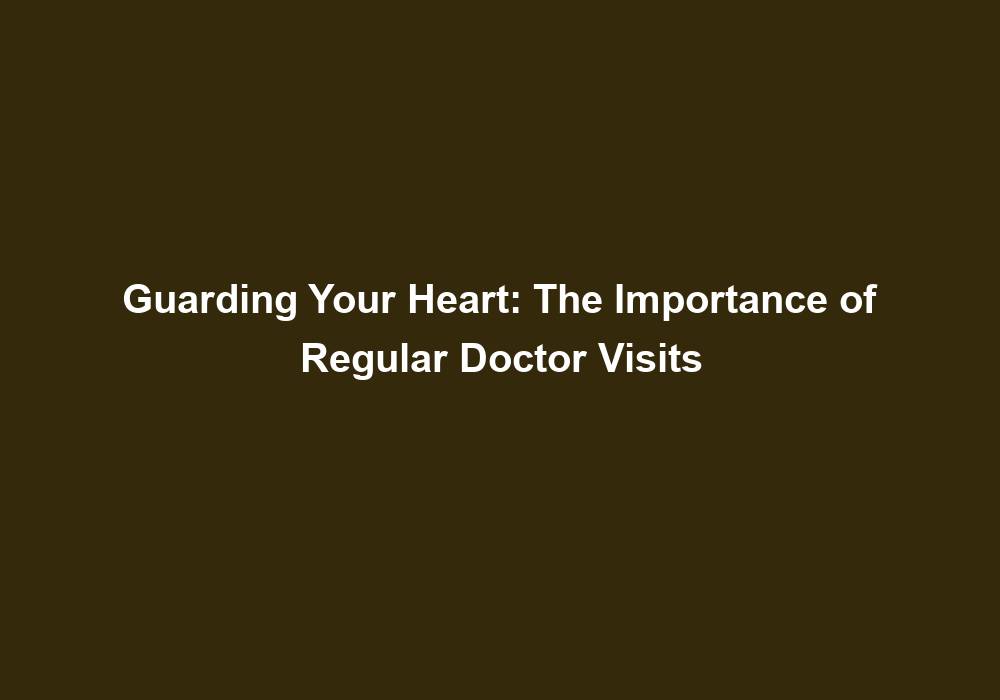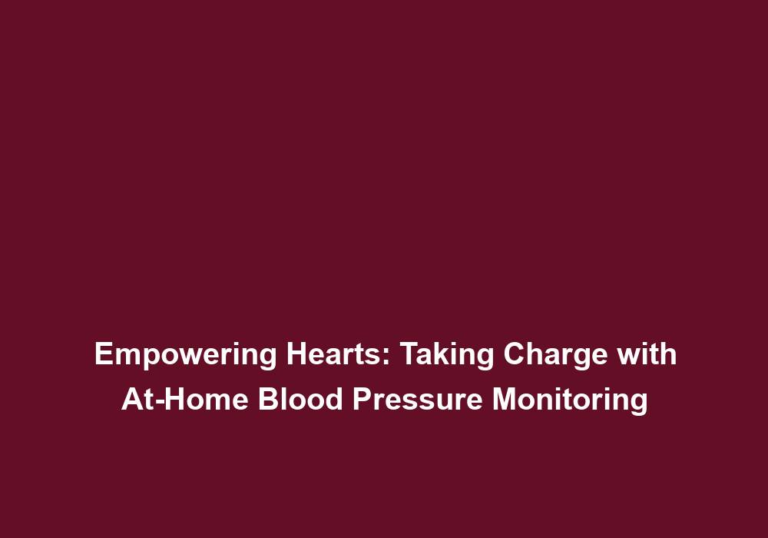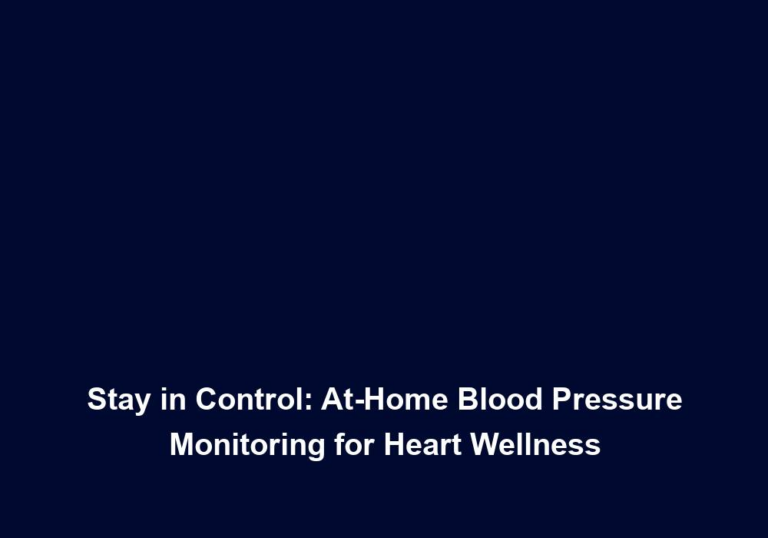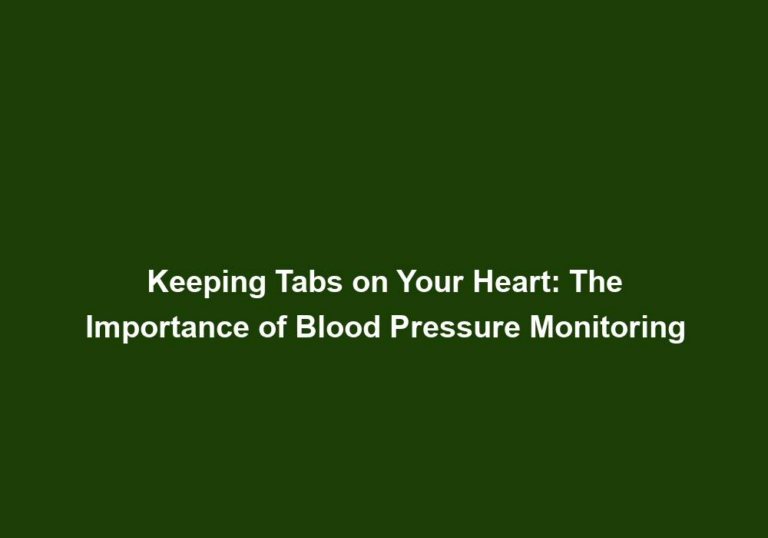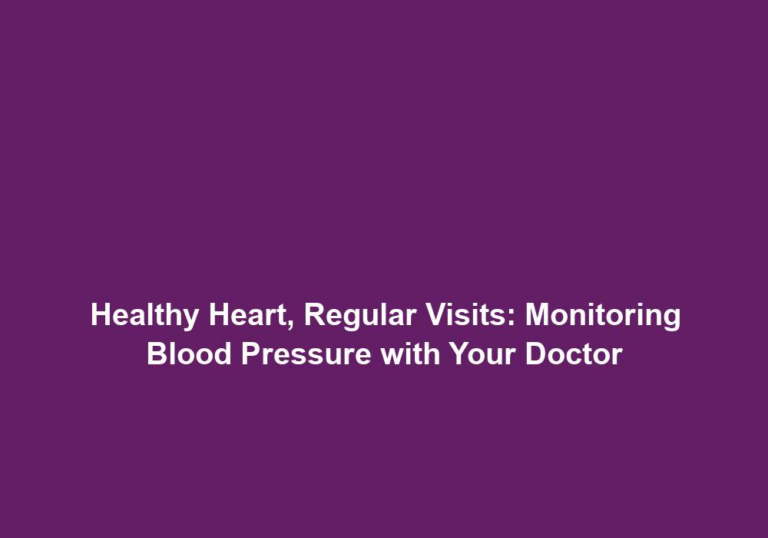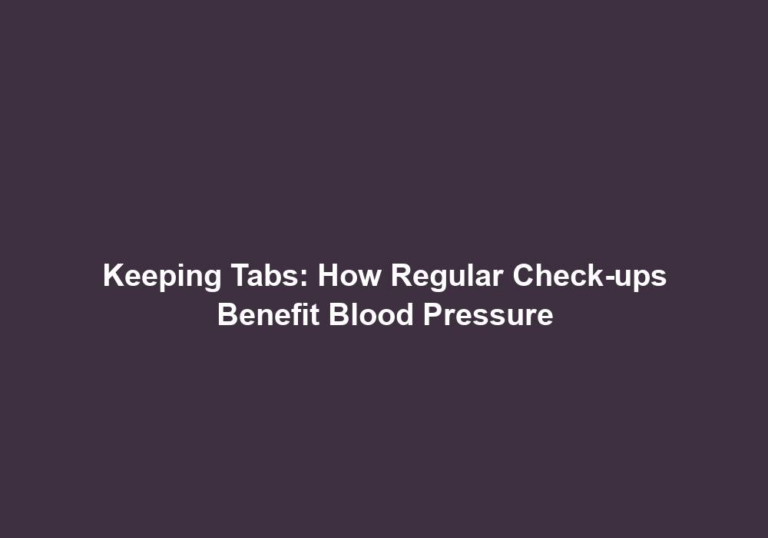Guarding Your Heart: The Importance of Regular Doctor Visits
Regular doctor visits are crucial for maintaining good overall health, and when it comes to your heart, they become even more essential. The heart is a vital organ that keeps our entire body functioning properly. Taking care of your heart should be a top priority, and one way to do that is by scheduling regular check-ups with your doctor. In this article, we will explore the various reasons why these visits are so important and how they can contribute to safeguarding your heart health.
The Role of Regular Doctor Visits
Visiting your doctor regularly allows them to monitor your heart health and identify any potential issues early on. Detecting problems in their early stages can greatly increase the chances of successful treatment and prevent any further damage to your heart. Your doctor will conduct a comprehensive examination, which may include:
-
Medical history review: During your regular check-up, your doctor will discuss your medical history, including any family history of heart disease or related conditions. This information helps them identify potential risk factors and determine the most appropriate course of action for your specific needs. By understanding your medical history, your doctor can take proactive steps to protect your heart health.
-
Vital sign assessment: Checking your blood pressure, heart rate, and other vital signs during your visit allows your doctor to evaluate your heart’s current state. Abnormal readings may indicate an underlying heart condition that needs further investigation. By closely monitoring your vital signs, your doctor can detect any changes that may require immediate attention and prevent potential heart problems.
-
Blood tests: Your doctor may order blood tests to assess your cholesterol levels, blood sugar, and other essential markers. These tests provide valuable insights into your heart health and overall well-being. By analyzing your blood test results, your doctor can identify any abnormalities and make recommendations for managing your heart health effectively. They can also provide guidance on lifestyle changes, medication, or other interventions if necessary.
-
Physical examination: A thorough physical examination helps your doctor assess your heart’s condition. They will listen to your heart sounds, check for any abnormalities, and evaluate your overall physical fitness. By conducting a physical examination, your doctor can identify any signs of heart disease or other cardiovascular issues. They can then provide appropriate recommendations and interventions to improve your heart health.
Understanding the Importance of Preventive Care
By scheduling regular doctor visits, you are embracing the concept of preventive care. Preventive care focuses on identifying and addressing potential health issues before they escalate into more significant problems. When it comes to your heart, preventive care plays a crucial role in maintaining its optimal functioning.
Benefits of Preventive Care for Heart Health
-
Early detection of heart disease: Regular check-ups allow your doctor to monitor your heart health and identify any signs of heart disease early on. Detecting heart disease in its initial stages can lead to better treatment outcomes and improve your overall prognosis. Early detection gives you the opportunity to make necessary lifestyle changes, take medication if required, and adopt measures to prevent further damage to your heart.
-
Management of risk factors: Regular doctor visits provide an opportunity to manage and control risk factors that contribute to heart disease, such as high blood pressure, high cholesterol, obesity, and smoking. By identifying these risk factors, your doctor can offer guidance on lifestyle changes, medication, or other interventions to reduce your risk. They can help you develop a personalized plan to manage these risk factors and protect your heart health.
-
Education and guidance: Your doctor can provide you with valuable education and guidance on heart-healthy lifestyle choices. They can help you understand the importance of regular exercise, a balanced diet, stress management, and other lifestyle modifications that can significantly impact your heart health. By educating yourself about heart-healthy habits, you can take proactive steps to prevent heart disease and lead a healthier life.
Maintaining a Heart-Healthy Lifestyle
While regular doctor visits are crucial for monitoring your heart health, there are also several steps you can take on your own to maintain a heart-healthy lifestyle. Incorporating these habits into your daily routine can complement the care provided by your doctor and further safeguard your heart.
Tips for a Heart-Healthy Lifestyle
-
Exercise regularly: Engaging in regular physical activity is essential to keep your heart strong and healthy. Aim for at least 150 minutes of moderate-intensity aerobic exercise per week. Consult your doctor for personalized exercise recommendations based on your health condition and fitness level. Regular exercise helps improve heart function, lower blood pressure, and reduce the risk of heart disease.
-
Eat a balanced diet: Adopting a heart-healthy diet can significantly reduce your risk of heart disease. Focus on consuming whole grains, fruits, vegetables, lean proteins, and healthy fats. Limit your intake of saturated and trans fats, sodium, and added sugars. A well-balanced diet provides essential nutrients that support heart health and helps maintain healthy cholesterol and blood pressure levels.
-
Maintain a healthy weight: Excess weight puts strain on your heart and increases your risk of developing heart disease. Strive to maintain a healthy weight through a combination of regular exercise and a balanced diet. Achieving and maintaining a healthy weight reduces the workload on your heart, improves blood flow, and decreases the risk of heart-related complications.
-
Quit smoking: Smoking is a significant risk factor for heart disease and various other health issues. If you smoke, seek assistance from your doctor or support groups to quit smoking effectively. By quitting smoking, you can significantly reduce your risk of heart disease and improve your overall cardiovascular health.
-
Manage stress: High levels of stress can negatively impact your heart health. Find healthy ways to manage stress, such as practicing mindfulness, engaging in hobbies, or seeking professional help when needed. Chronic stress can lead to increased blood pressure and heart rate, which can strain your heart. By managing stress effectively, you can protect your heart health and promote overall well-being.
Conclusion
Guarding your heart requires a proactive approach, and regular doctor visits are a crucial element in maintaining optimal heart health. By prioritizing these visits, you allow your doctor to monitor your heart, detect any potential issues early on, and provide personalized guidance for maintaining a heart-healthy lifestyle. Remember, prevention is always better than cure when it comes to your heart, so don’t neglect the importance of regular check-ups. Take charge of your heart health today and ensure a long and healthy life ahead.

